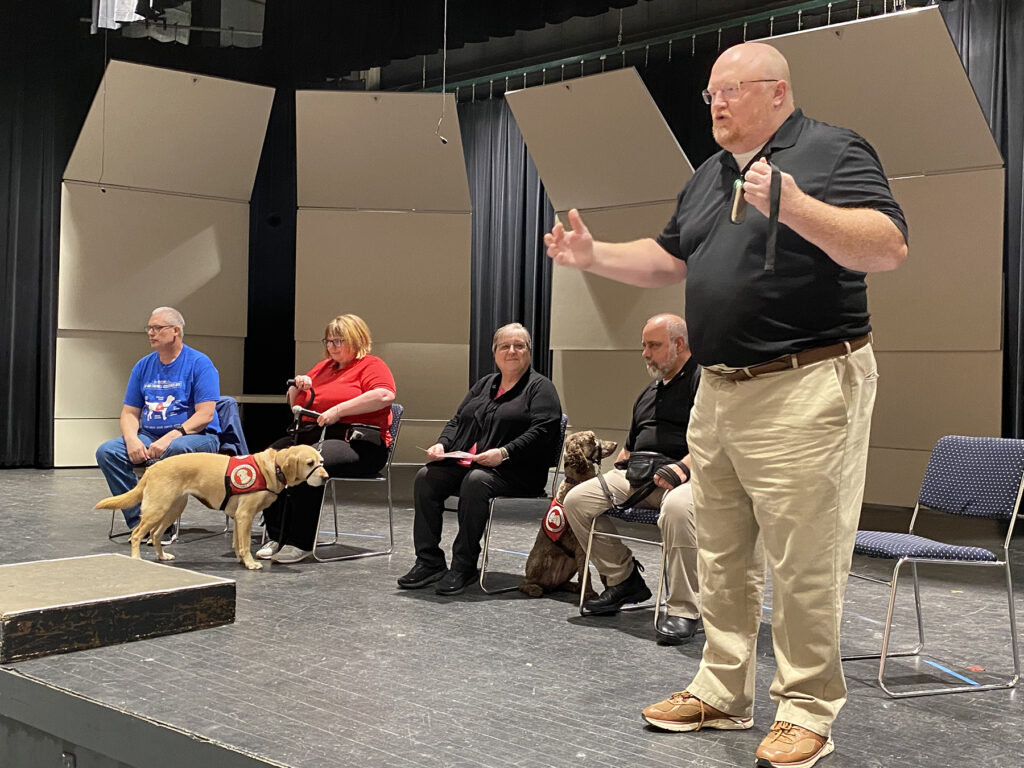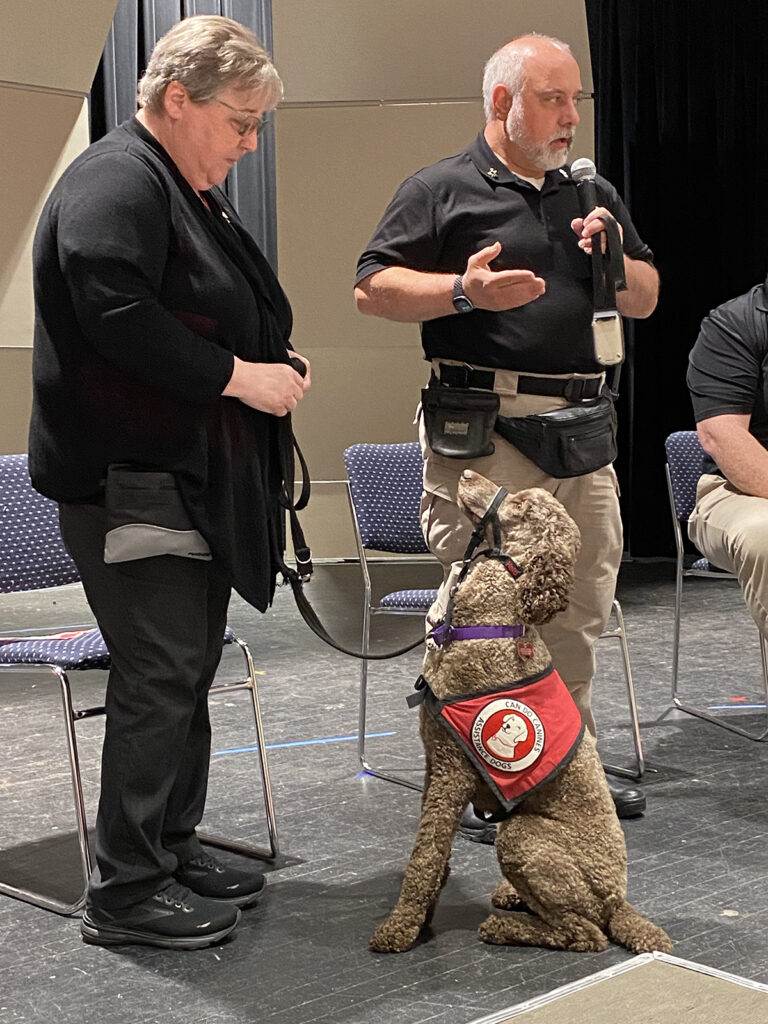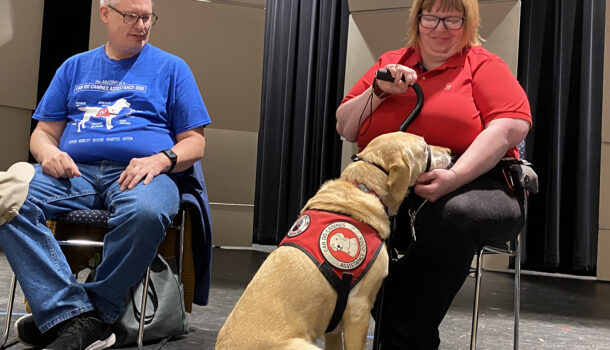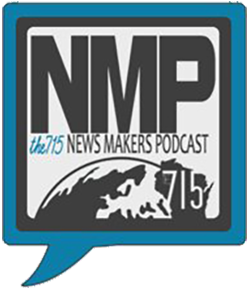ABOVE PHOTO: Amy Sabot, right, said her service dog, Mabel, a 6-year-old yellow lab, not only helps her perform a variety of physical tasks she can’t do on her own but provides emotional support as well. Beginning in the fall, 10 service dogs will receive training at UW-River Falls as part of the Falcon FETCH program on campus. Julian Emerson/UWRF photo.
The University of Wisconsin-River Falls will be home to new four-legged learners when the next school year kicks off in the fall.
The Falcon Fostering Education and Training Canines in Housing, or FETCH, program will pair 10 dogs with 22 UW-River Falls students who have committed to help train the dogs as service animals.
“We want to provide a hands-on, experiential learning opportunity for students in a way that helps them, the dogs and the greater community,”
-Chris Hergenrader
Chris Hergenrader, an assistant professor of animal science at UW-River Falls who will oversee Falcon FETCH, said he is especially excited about the new program because it will benefit not only the dogs and the students who train them, but people who rely on service animals as well.
“We want to provide a hands-on, experiential learning opportunity for students in a way that helps them, the dogs and the greater community,” Hergenrader said.
Falcon FETCH will be operated in coordination with Can Do Canines, a service dog training service based in New Hope, Minn. Can Do Canines has a strong track record working with other universities and has a high level of accreditation, Hergenrader said.
UW-River Falls started a separate service dog training program in 2016 called Assistance Dog Education Program and Training (ADEPT). That program was in conjunction with the Minnesota-based nonprofit Pawsitive Perspectives Assistance Dogs (PawPADs), but it is no longer affiliated with the university.
Some other universities, including the University of Minnesota, partner dogs with students to provide service dog training, but few have incorporated that effort into a living and learning community and actual courses focused on service dog training as will be the case at UWRF, Hergenrader said.
“As far as I know, our program is unique in the Midwest,” he said.
Service dogs at UWRF will undergo general training. After their time with their student trainers, the dogs will be returned to Can Do Canines where they will be trained to provide service in five areas: mobility assistance, autism assistance, seizure assistance, diabetes assistance and hearing assistance.
Most of the students who will work with dogs are animal science majors, although the program is open to any students, Hergenrader said.

Students will stay with their dogs in Stratton Hall, with much of the training taking place at the Lydecker Living Learning Center on campus. The companion animal program at UWRF was housed at Hagestad Hall but has been relocated to Lydecker because Hagestad is being torn down to make room for the new Science and Technology Innovation Center building.
“The new site will work well for us. It has a huge training space, which would have been hard for us to come up with,” Hergenrader said.
The dogs in the program will be between nine and 18 months old. They will be trained at UWRF for different lengths of time, depending on their age, Hergenrader said.
“The dogs must be mature enough to not cause problems in the dorm,” Hergenrader said. “We need this to be a partnership with Residence Life.”
Making a difference
The positive impact service dogs can have on people’s lives was evident during a May 19 visit to Meyer Middle School in River Falls by Can Do Canines trainers Pat and Dee Dee Heffernan and their 2-year-old standard poodle, Fawn, and Amy and Wade Sabot of Lakeland, Minn., and their 6-year-old yellow lab service dog, Mabel.

Amy has mobility challenges after a series of childhood medical maladies. Seemingly simple tasks such as bending over to pick up items are anything but easy for her, and she often struggles to perform routine tasks. Her husband Wade worried about her safety when he was away from home.
Four-and-a-half years ago, Amy received Mabel. They quickly bonded. When Amy needs help picking up items or cleaning her house, Mabel is there to assist. When Amy lifts weights or swims as part of her physical therapy program, Mabel grabs weights, goggles, swim cap and kickboard in her mouth and gets them to her owner.
Mabel also supports Amy in other ways. The dog provides emotional support, brightening Amy’s days when she is down and calming Amy’s anxiety.
“My husband has noticed a big difference in me,” Amy told an audience of middle school students, Mabel at her side. “I’m more independent, more confident. And I’m a lot more at ease talking to people now, talking to a group like this.”
That type of relationship that benefits a dog and its owner is exactly what Can Do Canines trainers hope for when they link dogs with people who need them, said Pat Heffernan, who has volunteered with service dogs since 1992 and raised them since 2006. Service dogs undergo intense training, he said, and not all dogs are cut out for that kind of work.
Dogs can be trained to help people in many ways, he said, such as notifying a diabetic owner when their blood sugar is too low or high. Giving up the dogs after he has raised them is difficult, he said.
“It can be hard to give them up,” he said. “But you know it is the right thing to do because you know that these animals will be helping people who need them.”
‘Make you feel good’
That sense of benefitting others is what drives Hergenrader to start a service dog training program at UWRF. After listening to Amy tell her story, he turned to an onlooker and said, “That’s what a program like this is all about – helping dogs help people.”
Working with service dogs will give students involved in Falcon FETCH valuable experience that they can use in various ways, he said.
“This is going to be a big challenge for students, spending so much time with these dogs,” Hergenrader said. “It is a big responsibility, but it is also a big opportunity.”
Hergenrader hopes to grow Falcon FETCH and further develop the program. He envisions it as one way to attract more students interested in companion animals to UWRF, providing them with a unique experience by incorporating the program into the curriculum. That curriculum will be aligned with certification for professional dog trainers.
Training service dogs won’t just be a labor of love, Hergenrader said, but will have practical outcomes. Falcon FETCH students could use their experience for dog training, owning a boarding facility or as the foundation for becoming a veterinarian, he said.
Jobs related to animal behavior are on the rise, Hergenrader said, a fact that might be due in large part to people’s affinity for them. That makes sense, given that scientific studies show that human’s stress hormones like cortisol drop when they are around dogs and feel-good hormones such as oxytocin rise.
That law of science was evident when Mabel and Fawn were led through Meyer Middle School. As students and adults alike gathered around the dogs, their faces lit with smiles.
“You can feel the stress go down when a dog is around,” Hergenrader said, smiling himself. “They just make you feel good.”


